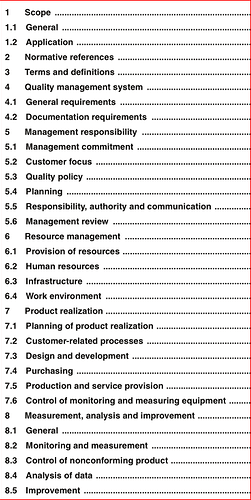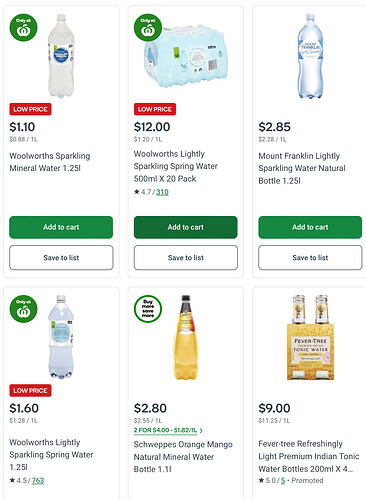In Australia we are fortunate that our water out of a tap is a very good standard.People who buy bottled water to me are throwing away their money
A company in Melbourne is just bottling tap water , or more correctly water from our catchments , and is doing great business Check link below
Nothing better than a huge multiplier on selling tap water is there  Gotta love those enterprising people /sarc
Gotta love those enterprising people /sarc
Much of the bottled water is just tap water filtered by reverse osmosis. As previously posted by @BrendanMays
and
It is amazing what can be ‘sold’.
On it goes. An ABC War on Waste episode report that once again tells it like it is.
… and Nitrogen is a major active ingredient in most explosives, yet I breathe in huge amounts of it every day!
Chlorine gas was used in war to incapacitate/kill opposing forces, yet I ingest a significant amount of Chlorine every time I eat salt.
An even bigger concern (if this sort of thing really is a concern) is that Phosgene gas was used as a chemical weapon during World War I and accounted for tens of thousands of deaths. It is made of Carbon, Oxygen and Chlorine! ![]()
![]()
Clearly the various alternative uses of some elements have absolutely no relevance, other than for scaremongering.
Are we forgetting?
Australasian Bottled Water Institute’s (ABWI) Model Code.
Surely like the ‘Ponds Institute of Beauty’ we need to trust this august and heavily credentialed body?
As usual it looks like we are all being taken for a ride by a quasi industry sponsored marketing support body? Noted it’s primary compliance standard is ISO9001. And a primary activity is accrediting any one who pays for it’s services as complying with the code.
This does include applicable food safety requirements as legislated in each state. So not all bad. Ponds no doubt did tests to minimise allergic reactions from cosmetics, so they were doing good too.
How many genuine consumer and government statutory bodies are members of this and similar groups? None it appears.
Surely their existance and pretence of authority should be the subject of consumer regulation?
ISO9001 is a management and process standard that is intended to improve quality by 360 degree feedback into the processes. It has nothing directly to do with quality. It costs to have a certification audit, and recurring audits are required but it is more than just paying ISO.
Pardon the frivolity and gross oversimplification, but if the company procedure is:
- Take empty bottle from case
- Put bottle in left hand
- Position bottle under tap
- Open tap with right hand
- Close tap
- Screw lid on bottle until tight
The auditor will check whether there is evidence that is done. Sighting the evidence the company gets the ISO9001 tick. Again, it is a bit more complex than that, but. The process itself can be ludicrous but the test is whether it is followed. The theory is that if for example each bottle of water has dirt in it, that will be reported and a quality team will review it and find out why, and add or refine a step. Maybe ‘install filter to tap’ that should reduce or remove the dirt content.
There also needs to be demonstrable management support for a quality program as well as internal education, lots of documentation, and so on.
s/One who spent a few years as an ISO9001 management rep responsible for the company program.
Does that really matter? Surely the important thing for marketing purposes is whether or not they wear white lab coats? ![]()
Thanks for the pickup and real life depiction of ISO9001 in action.
No doubt the description ‘Model Code’ against which they audit others excuses any possible confusion in the minds of the average consumer with statutory “codes”.
“Model” can legitimately describe a non working replica?
p.s. The lab coat I was supplied is sort of dark grey and a bit moth eaten. Does that count?
Further info:
http://asq.org/learn-about-quality/iso-9000/iso-9001-2015/
ISO9001 accreditation does not necessarily mean a high quality product. It could mean a rubbish product manufacturered with a consistent quality.
Exactly, so long as the rubbish procedures are conscientiously followed ![]()
However if the product fault reports (however defined) did not keep reducing eventually the certifying auditor would flag them to lose their certification.
So for a rubbish product manufactured consistently as a rubbish product and accredited to ISO standards to fail accreditation it needs to be ‘no longer rubbish’?
Or perhaps rubbish in a different way?
And some how the outcome needs to be detected and reported such that the accredited ones come to be aware of the difference.
It’s an interesting way of looking at accreditation and the application of quality standards.
If my bottled water was found to be 99.9999% contaminated with 12 yr old single malt  it would fail. As might finding the bottled water was actually high octane aviation fuel.
it would fail. As might finding the bottled water was actually high octane aviation fuel.
Of course one possibility is more likely than the other to be reported and an NCR raised! If that’s how the 360 degree loop is closed.
I get it!
I forget the frequency of audits at the various levels, but fails on the critical items causes loss of certification. The standard addresses the following, and not every clause is applicable to every business. A few years ago the initial audit for a fairly small business to get certified was in the order of $20-40,000 in consultant (auditor) fees, plus the costs of annual audits that generally were from 1-4 days each.
A dodgy company could game the system for a time but the majority of certified companies seem to benefit from the process and formality, while some have a tick the box approach that is not nearly so beneficial for them or their customers.
My purpose here is not to defend ISO9001, just to try to put it in perspective as to what it is and how it works.
Maybe another will follow, and another? I might wake up and realise it is all a dream but this is not on The Shovel…
I refuse to buy bottles of water unless in desperate need if I run out of my own water. Maybe it would reduce the amount of plastic waste
‘Fine water’ is a marketing triumph targeting people who have way too much money and no responsibility, excepting to their personal gluttony. OTOH is it really different than good wine that varies widely from producer to producer where some have discerning palates and others struggle to differentiate one from another, or a single bottle of scotch that broadcasts the buyer doesn’t worry about their accounts?
The best water I’ve ever tasted came from a small stream in the mountains in New Mexico after we’d been walking all day. Icy cold, clean, and delicious. Fine water, indeed!
It probably was excellent quality, but I’m sure the circumstances had a lot to do with its taste.
One would perhaps be primed to find bottled water particularly ‘fine’ knowing one has committed to paying an obscene price for it in a high-priced restaurant where all the other diners, and the staff, will know just how much one is spending. ![]()
Years back there was a great restaurant in San Francisco area with an outstanding scotch collection. One scotch came in ‘a stone flagon’ as well as a ‘crystal decanter’ for 3 times the price. I asked if it was the same scotch and without hesitating they replied yes, and added ‘it is surprising how many ordered the crystal decanter because it was brought to the table tor pouring, and everyone knew’.
Even everyday has it’s premiums.
Our rain water filtered and sterilised is delivered to the drinking tap at around $5 per 1,000 litres. Tastes great. Reusable SS insulated bottle perfect when out and about.
The retail priced luxury of a plastic bottle slightly more.
Whether Mount Franklin Lightly Sparkling Natural Mineral Water deserves the premium,
or can one justify paying $1.60 for Woolies brand Lightly Sparkling Spring Water, 50c more expensive than their Sparkling Mineral Water?

